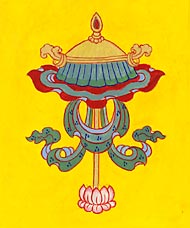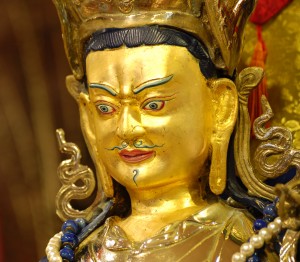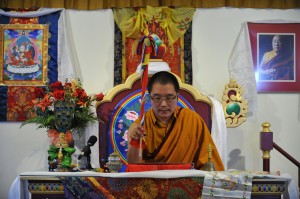
The following is an excerpt from a teaching by Jetsunma Ahkon Lhamo called “Your Treasure is Heart”
We are really happiest when we are completely surrendering—letting that love, that concern for the welfare of others, that Bodhichitta—be the captain of our ship, instead of that nasty little manipulative self-serving ego that’s running around trying to control everything and making everybody, including ourselves, crazy. We will find that the level of neuroses in our lives begins to go down. And we will find that, lo and behold, just like the Buddha taught, we have really begun to create the causes for happiness. It really works.
There are changes that you’ll go through, changes that I go through constantly, even still. You may find that happiness does not take the form you thought it was going to take, but let me tell you something. I’m forty-six years old. If you have come anywhere near my aged self and haven’t figured out that life is not going to do what you thought it was going to do anyway, then you have been asleep at the wheel! Why not make it work for you? Because nothing is going to take the form you thought it was going to, no matter what you do. Most particularly, if you spend your time trying to control and manipulate others, and if you live a life completely concerned with ego-cherishing, then life really won’t deliver. But hey, figuring that out is all part of growing up. We see that. Your five-year plans, your ten-year plans, forget it. I guess about some aspects of your life you can do that, but you will find that as the Bodhichitta begins to truly manifest in your life, it requires true surrender. And your life will not take the form that you thought it was going to, because this Bodhichitta cannot be controlled. It is not a toy for you to make only you happy. It is the display of that nature that is our ground of being and to which we are all equally entitled and ultimately responsible for. As you begin to taste that nectar, you realize that in all the world, sentient beings are suffering. And in worlds and worlds that we cannot see, sentient beings are suffering; and that we have in our hands, like a precious jewel or a golden key, the means by which some understanding or some help can come to them. So let us now commit our lives and remain absorbed in that kindness, and transform this present life and every future life into a vehicle by which the end of suffering will be brought about and all sentient beings will be liberated.
So this is the teaching, and this is our wish. And I hope from the depth of my heart that each one of you will consider it very carefully and then make the choice for transformation. We hate that word. Transformation is a scary key word. We sort of like it in theory—it sounds so dynamic and powerful. But when, let’s say for instance astrologically, someone says to you, “Well, you know you’re about to go through a major transformation,” we are terrified. Quick, batten down the hatches. Don’t let anything change. But, if you live long enough, you’ll find out that life is going to transform you one way or the other. You will go through transformations. You will go through things. So go through that which will benefit you and all sentient beings.
Do not leave this continent of precious jewels empty handed. When you go into your next life, I hope from the depth of my heart that you have somehow managed to take the nectar from this life and truly internalize it, and enter into your next life nurtured by the power of Bodhichitta.
Copyright © Jetsunma Ahkon Lhamo. All rights reserved








